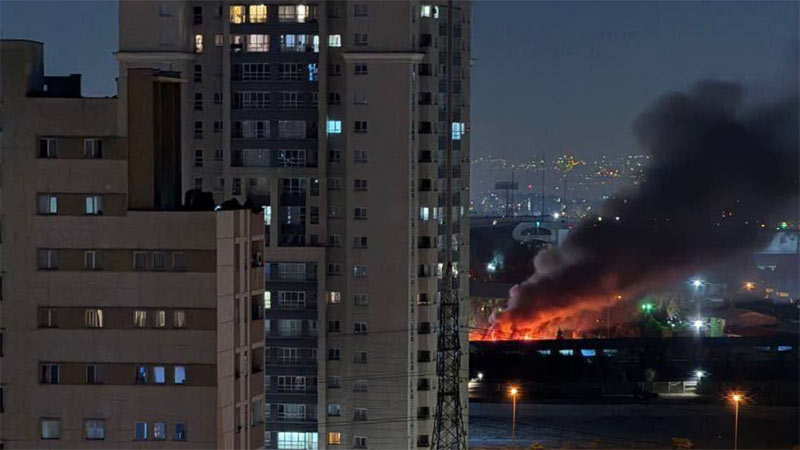Iran to deliver ‘Harsh Response’ to Israeli attack, security sources say

Photo: AF Post
Israel has launched a major military operation against Iran, striking nuclear facilities, missile factories, and military leaders in what it says is an effort to stop Tehran from building a nuclear weapon.
Explosions were reported across Iran early Friday (June 13), including at the key uranium enrichment facility in Natanz.
Iran’s media also confirmed the death of top Revolutionary Guards commander Hossein Salami and damage to the elite unit’s headquarters in Tehran.
Several children were reportedly killed in a residential area of the capital.
In response, Israel declared a state of emergency, preparing for expected retaliatory missile and drone strikes from Iran.
“We are at a decisive moment in Israel’s history,” said Israeli Prime Minister Benjamin Netanyahu in a recorded video.
He announced the start of Operation Rising Lion, calling it “a targeted military operation to roll back the Iranian threat to Israel’s very survival.”
Netanyahu added that the campaign would continue “for as many days as it takes” to remove the threat.
Iran’s Supreme Leader Ayatollah Ali Khamenei condemned the strikes, calling them a “wicked and bloody crime” and promised that Israel “will receive a bitter fate.”
An Iranian security official told Reuters that Iran is preparing a strong and decisive response, with discussions ongoing at the highest levels of government.
This marks a dramatic escalation in tensions between the two nations and raises fears of a broader regional conflict.
UPDATE – 11:30 PM:
Iran launched approximately 100 drones toward Israeli territory in retaliation, which Israel is working to intercept, Israeli military spokesman Brigadier General Effie Defrin said.
Iranian media and witnesses reported explosions, including at the country’s main uranium enrichment facility in Natanz, while Israel declared a state of emergency in anticipation of retaliatory missile and drone strikes.
Israel has now confirmed that the Chief of Staff of the Iranian Armed Forces, the Commander of the Revolutionary Guards, and the Commander of Iran’s Emergency Command were all killed in the strikes across Iran, Defrin said during an online briefing.
Iran’s Supreme Leader Ayatollah Ali Khamenei stated that Israel had “unleashed its wicked and bloody hand” in committing a crime against Iran, adding that Israel would face “a bitter fate.”
UPDATE – 02:20 PM:
Here is a list of the top commanders and nuclear scientists who Iran says were killed in the Israeli strikes:
HOSSEIN SALAMI
Salami was commander-in-chief of Iran’s elite Islamic Revolutionary Guards Corps, or IRGC. Iran’s Supreme Leader Ayatollah Ali Khamenei appointed Salami, who was born in 1960, as head of the IRGC in 2019.
MOHAMMAD BAGHERI
A former IRGC commander, Major General Bagheri was chief of staff of Iran’s armed forces from 2016. Born in 1960, Bagheri joined the Guards during the Iran-Iraq war of the 1980s.
GHOLAMALI RASHID
Major General Rashid was head of the IRGC’s Khatam al Anbia headquarters. He previously served as deputy chief of staff of the Iranian Armed Forces, and fought for Iran during the 1980s war with Iraq.
FEREYDOUN ABBASI-DAVANI
Abbasi, a nuclear scientist, served as head of Iran’s Atomic Energy Organization from 2011 to 2013. A hardliner, Abbasi was a member of parliament from 2020 to 2024.
MOHAMMAD MEHDI TEHRANCHI
Tehranchi, a nuclear scientist, was head of Iran’s Islamic Azad University in Tehran.
Four other scientists killed in Friday’s strikes are Abdolhamid Manouchehr, Ahmad Reza Zolfaghari, Amirhossein Feghi and Motalibizadeh.
Latest Headlines in Sri Lanka
- Six police officers arrested over alleged priest assault granted bail January 29, 2026
- Sri Lanka moves toward ‘Dream School’ system for all grades January 29, 2026
- ASP Rohan Olugala appointed Director of Walana Anti Corruption Unit January 29, 2026
- Sri Lanka launches five-year national action plan to combat human trafficking January 29, 2026
- Équité launches media guidelines to protect LGBTIQ+ rights in Sri Lanka January 28, 2026


